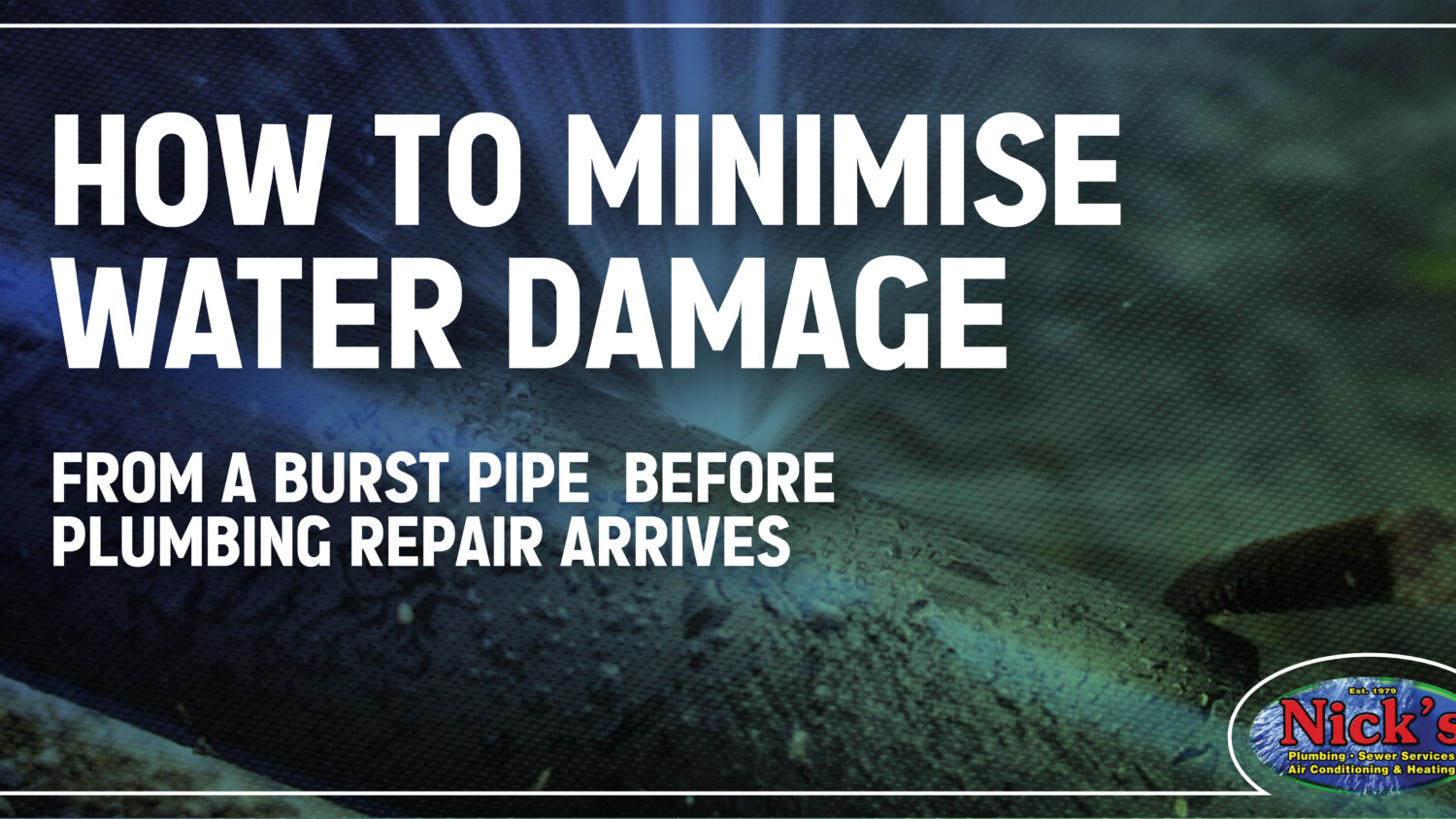Water damage. Just two words. Only four syllables.
As short as it is, few phrases strike complete fear into a homeowner’s heart as “water damage.” It’s not so much those two words themselves as the words surround them in a sentence like “I’m sorry to tell you this, but there is extensive water damage in your attic, living areas, walls, and maybe even the foundation.” That sentence is never followed up by “you’ve also won ten-to-twenty thousand dollars to help fix it”—you know it will cost you a fortune. And you panic.
You don’t have to be scared today. This is just a blog about water damage, the havoc that can ensue from a leaking supply line in a wall or a failed water heater tank in an attic, and what can be done to prevent potentially thousands of dollars worth of damage, a whole mess of inconvenience, and offer a little peace of mind as well.
What Causes Water Damage in a Home?
The number one claim against homeowner’s insurance policies every year is for water damage caused by plumbing emergencies. Think about it. Your plumbing system is an advanced network of pipes, faucets, hose bibbs, water heating equipment, and all fittings and fixtures. Eventually, something is bound to wear out.
Broken Water Supply Pipes and Faulty Valves.
Most of your plumbing system is out of view, except for the exposed bathroom sink and kitchen drain pipes—even the ones in cabinets or vanities are still considered “exposed.”
Almost all your home’s water supply lines are tucked away from sight behind drywall, above the ceiling, and under the floors. This unfortunate fact makes locating water supply pipe leaks difficult before they can do severe damage.
It usually isn’t until a plumbing leak has caused apparent significant damage that it gets noticed. Once structural damage, mold growth, or increased water bills are bad enough to be noticeable, the damage has already been done.
Signs of Broken Water Supply Pipes
- Water stains/discoloration of walls, ceilings, or floors. Check to see if these stains are damp to the touch. If so, you have an active leak somewhere. It’s time to call a professional plumbing company to locate and repair it as soon as possible.
- Lower water pressure which is isolated to a single bathroom or fixture, that came on suddenly.
- Hissing or the sound of running water behind your walls or in ceilings, particularly when there are no running faucets or appliances using water.
Water Heater Tank Failure.
While failing water supply lines and valves tend to do their damage over an extended period, the failure of a water heater tank eliminates all that pesky time stuff and does the damage all at once. Most commonly found in the attic, your water heater contains anywhere from forty to one hundred gallons of water that will find its way into your home in the event of a catastrophic tank failure. Quickly.
Even when located on the ground floor of your house, a failed water heater tank will still expel an enormous amount of water when it fails. And it’s going to make a mess. Walls, ceilings, floors, support beams, carpets, furniture, family heirlooms, and photographs can all be lost in minutes. Keeping an eye out for some of the more apparent symptoms can help you dodge the costly destruction of a tank failure.
Signs of Potential Water Heater Tank Failures.
- It’s getting older. Most tank-type water heaters have an average lifespan between eight and twelve years, assuming they have been well-maintained and operated correctly. Any major repair of a water heater older than seven years is not recommended, especially when the repair cost is equal to or more than half of the cost of a water heater replacement.
- There are visible leaks or rust on the outside of the tank. All water heaters sweat, so all tank-type units are installed on top of a drip pan that collects the excess moisture and routes it to a drain. Rust along the seam of a water heater tank is an ominous sign that the protective glass lining inside has been breached, and water is escaping.
- The water heater is making strange noises. Any scraping, rattling, thumping, or banging sounds from a tank-type water heater usually means a significant amount of sediment has collected in the tank from a lack of maintenance. You can have a professional plumbing company attempt to drain and flush the tank to remove some of the sediment, but by the time you can hear the sediment, it may already be too late to save the water heater.
Broken Drain Pipes or Sewer Lines.
While not as known for causing catastrophic property damage as pressurized water supply lines or giant tanks filled with liquid, drain and sewer lines deserve an honorable mention as a potential source of water damage. Drainpipes and sewer lines have one purpose, to remove unsanitary wastewater from your home and deposit it in the city sewer line or a septic tank.
Sewer line breaks are less likely to cause damage to the interior of your home but can make a mess out of your yard, with shifting soil, damp spots, and puddles ruining your lawn.
Signs of a Broken Drain or Sewer Line.
- Sagging floors around sinks or toilets. Broken or leaking drain pipes in a bathroom or kitchen can significantly weaken floors and foundations, as can a broken toilet flange. As the pipes and the structure around them start to sag, connective fittings will be broken, allowing wastewater to escape the line and leak into the home.
- Something is going to smell funny. Drain and sewer lines contain wastewater—a pleasant way of referring to all the awfulness rinsed down our sink, tub, and toilet drains. The nasty concoction of various unwanted waste products emits noxious gases, and sewer gas is among the most dangerous to be exposed to. Contact a professional plumbing company to prevent further exposure to pathogens and bacteria that can result in illness for your entire family.
- You start to notice uninvited guests. Bugs love water, and some bugs prefer wastewater. Rats and mice can be drawn to a water leak, along with snakes. If you notice more critters around the house, it could be a sign that you have a broken sewer or drain line.
Is Water Damage Caused by Plumbing Covered by Insurance?
Whether or not water damage caused by plumbing is covered by insurance depends on your insurance policy’s specific terms and coverage. Generally, homeowners insurance policies cover water damage caused by sudden and accidental plumbing issues, such as burst pipes or an overflowing washing machine. However, it’s essential to review your policy carefully and understand any exclusions or limitations that may apply.
For example, some insurance policies may not cover water damage caused by gradual wear and tear on your plumbing system, such as leaking pipes or a faulty water heater. In addition, most insurance policies limit the coverage available for water damage and may exclude certain types of damage, such as mold remediation.
What Can I Do to Prevent Water Leak Damages?
Schedule regular maintenance for your plumbing system, appliances, fixtures, etc., to ensure everything is in good working order. Annual plumbing inspections are a good idea as they can help the homeowner catch any possible minor issues before they become major problems.
Ensure you know where your main water shutoff valve is located and how to turn it off in an emergency.
Inspect your pipes and hoses regularly for signs of wear and damage, such as cracks, corrosion, or leaks, and replace them if necessary.
Be mindful of what you put down the drain: Avoid pouring grease, oils, or other materials that can clog your pipes down the drain.
Don’t Waste Time When You Find a Leak. Call for Help!
Nick’s Plumbing has been detecting and repairing hidden water leaks in the Houston area since 1979, with our licensed, experienced plumbing professionals who consistently earn five-star ratings. If you’re experiencing signs of a damaging water leak in or around your home, time can equal money—Call Nick’s Plumbing to arrange an appointment.
Call Nick’s Today. We’re on the Way.


























